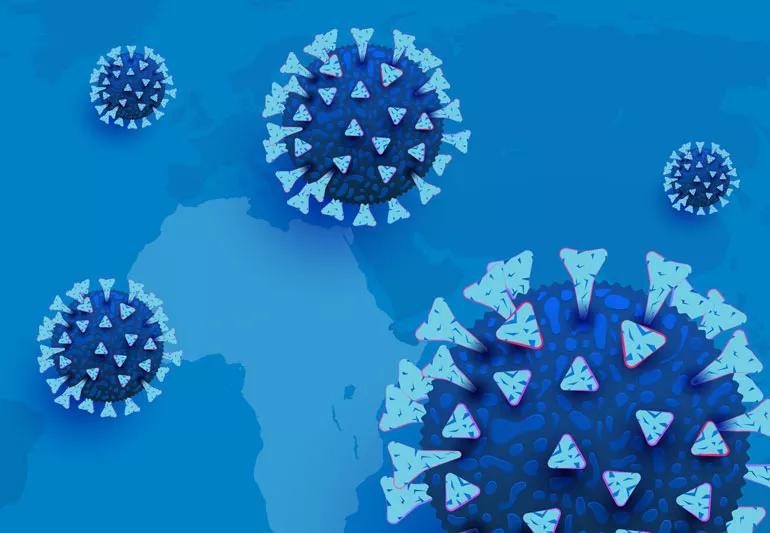What we do – and don’t – know about the latest COVID-19 variant

Image content: This image is available to view online.
View image online (https://assets.clevelandclinic.org/transform/030a468e-5261-4630-a20b-edc6fd24367f/omicronCovidAfrica1-1356812437-770x533-1_jpg)
COVID omicron varient originating in Africa
As the COVID-19 pandemic stretches on, yet another variant to watch has emerged that’s causing apprehension as it spreads across the globe.
Advertisement
Cleveland Clinic is a non-profit academic medical center. Advertising on our site helps support our mission. We do not endorse non-Cleveland Clinic products or services. Policy
The omicron variant, also known as variant B.1.1.529, is considered a “variant of concern” by both the World Health Organization (WHO) and the Centers for Disease Control (CDC). First detected in South Africa in early November, the variant has spread to dozens of countries, including much of Europe and the United States.
There’s still a lot we don’t know about the omicron variant. But after the dominant spread of the delta variant this summer, experts are busy gathering as much information as possible. To get an idea of what we do know about the omicron variant and what’s next, we spoke with infectious disease specialist Kristin Englund, MD.
The main difference between omicron and previous variants has to do with its mutations. “Omicron has 50 mutations in its genetic code, many more than we have seen on any other variant,” says Dr. Englund. “Thirty of these mutations affect the spike protein, which the vaccines currently available utilize.”
The delta variant caused alarm because it spread more easily than previous variants. So far, early data suggests that the omicron variant is even more contagious, says Dr. Englund. “But we don’t yet know if it causes more severe illness,” she says.
Advertisement
Experts around the world are still digging deep into data about the omicron variant to learn as much as they can, as quickly as they can. Besides the level of illness caused by omicron, scientists are looking into how all of those mutations affect the virus, says Dr. Englund.
Other questions that remain to be answered include:
As frustrating as the unanswered questions can be, it’s important to remember that research is unfolding in real-time since COVID-19 is caused by a new coronavirus. Experts continue to work quickly and diligently to uncover all they can as each new variant emerges.
Like everything else with the omicron variant, more research is needed for a clear-cut idea of how well current vaccines protect us against the new mutation. But, notes Dr. Englund, early data is promising.
“Early data from Pfizer seems to show that while the initial two-shot dose is less effective against the Omicron variant, the booster increased the antibodies in our immune systems 25-fold, and should offer much more protection,” she says.
There’s no word yet regarding how effective the Moderna or Johnson & Johnson vaccines are against the omicron variant, but research from those companies is ongoing. Dr. Englund adds that if the existing vaccines need to be updated, the wait won’t be a long one.
Companies that produce the vaccines are already looking into how the vaccines can be altered to fight omicron directly. “The mRNA technology is making it much easier to modify the vaccines more quickly,” Dr. Englund points out. “If needed, those companies feel they could have a new vaccine against a new variant within three to four months.
While the omicron variant gains attention as it continues to spread — and Dr. Englund says its spread is already probably well beyond what we currently know — it’s also important to worry about the variant that’s actually dominant right now. As of early December, the CDC reported that the delta variant was responsible for 99.8 to 99.9% of current COVID-19 cases in the United States.
“Omicron likely will spread rapidly but we must still stay vigilant of the variant that’s already here — the delta variant — and do all we can to protect ourselves and others,” she says. “The only way we can avoid further variants is to decrease the amount of virus, and that means getting vaccinated and getting your booster when it’s time.”
Advertisement
Besides protecting against variants, continuing to practice safe, proper guidelines will help to curb the ongoing mutations. “New variants will continue to develop as long as the virus can make copies of itself and spread,” she says. “We need to be smarter than the virus and stop it with vaccines, social distancing, masking and proper hand hygiene.”
Advertisement

Sign up for our Health Essentials emails for expert guidance on nutrition, fitness, sleep, skin care and more.
Learn more about our editorial process.
Advertisement
It’s best to treat flu-like symptoms as if you have COVID-19
COVID-19 reinfections are on the rise, and there’s no limit to how many times you can get infected
A look at four medications and how they're being used
More data that two are directly linked
Are you wearing yours the right way?
The short answer from an infectious disease specialist
It's all about small goals and riding the emotional wave
The short answer from a pulmonologist
Type 2 diabetes isn’t inevitable with these dietary changes
Applying a hot or cold compress can help with pain
Pump up your iron intake with foods like tuna, tofu and turkey